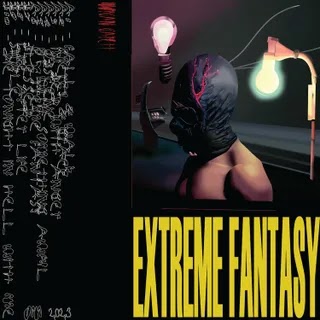Ambient musician KMRU and experimental producer Aho Ssan balance tectonic rumbling and grinding steel against whispering white noise and synthetic choirs.
Growing up in Nairobi, Kenya, Joseph Kamaru was accustomed to noise. Then, as a teenager, he moved outside the city, and the din eased; the sounds of traffic and souped-up matatus gave way to birdsong, and he began carrying a handheld recorder, learning to navigate the world with his ears. His eureka moment as a young artist was discovering that he could channel the sounds of a rickety old passenger train into looping rhythms; that was the birth of the musical style that he has developed under his KMRU alias on recordings like his 2020 breakout album Peel, where field recordings and synthesized sounds come together in a porous weave. A prolific producer, KMRU has continued to explore the use of field recordings across a number of mostly self-released recordings, sometimes emphasizing tonal elements and elsewhere pushing deeper into the swirl of found sounds; what has held constant is his music’s meditative quality.
Where stillness reigns in KMRU’s music, Niamké Désiré courts chaos. Better known as Aho Ssan, the Parisian electronic musician builds his own virtual instruments in the visual programming language Max/MSP; whatever numbers are being crunched under the digital hood, his music often feels like a snapshot of something being torn at the molecular level. His debut album, 2020’s Simulacrum, recalls the church-on-fire drama of Ben Frost, but pay close attention to his swells of distortion and what at first appears to be a solid wall of sound disintegrates into waves of granular detail, every bass hit a boulder crumbling to dust.
Even so, Désiré’s music is not without its more contemplative register, so you might assume that a meeting of the two musicians would entail finding a halfway point between their respective styles. But when they sat down together, they surprised even themselves: “I never made something so extreme,” said Désiré of their first recording. Featuring three tracks composed and recorded on three separate occasions, Limen documents the duo’s ongoing dialogue.
“Resurgence,” based on an installation they created for Berlin Atonal’s 2021 edition, opens Limen with what sounds like an orchestra tuning up in a burning theater, static crackling at the edges of thickening drones; it’s somehow harsh yet lulling. Three and a half minutes in, the first real motif appears: a mournful lead melody somewhere between a trumpet and a table saw that sounds more dramatic and more regal than anything in either artist’s catalog. The bass rumbles volcanically; the edges of the soundscape are a sustained paroxysm of sharpening knives and sandblasting guns. Roughly halfway through the 12-minute piece, there’s a brief decrescendo, only for the assault to resume with renewed force before something even more surprising happens: The quaking bass briefly smooths into a syncopated pattern reminiscent of techno. And then, the shards having momentarily assembled themselves into relative order, the whole thing dissipates, bowed strings and whispers of white noise dissolving back into nothingness.
“Rebirth” pursues similar ideas. Again, the space of the track is a broad field of sourceless shimmer; there are alien hints of symphonic timbres, as if an AI had been trained to replicate frequencies vacuumed up from the orchestra pit. Crusted in distortion, the low notes throb, while the high end throws off a steady spray of sparks, like a slab saw cutting through stone. But the tonalities are more consonant, and the track’s relatively compact form, just five and a half minutes long, yields a swifter climax and neater denouement than “Resurgence.” Manageably bracing, it’s a thimbleful of whisky compared to its predecessor’s tumbler of bleach and broken glass.
The closing track is the album’s longest: “Ruined Abstractions,” the duo’s first recorded collaboration, runs more than 20 minutes. It was originally released as part of a lockdown-era compilation series in December 2020, but its inclusion here makes for an interesting contrast. In one sense, it’s noisier than either “Resurgence” or “Rebirth,” particularly in its opening movement, where the squealing and grinding suggests a riot of shortwave radios and dental drills. But even here, its noise feels relatively refined, never quite reaching the forcefulness of its predecessors. And in its second half, glowing tones modeled after strings, organs, and wordless choirs predominate. In its grace, the music isn’t a world away from the liturgical compositions of Arvo Pärt—just scorched and serrated, sliced by knives and baptized by fire, a mirror image of beauty and destruction. It remains considerably different from either artist’s solo work, yet in its introspective depths, you can glimpse the fingerprints of both.














%20Music%20Album%20Reviews.webp)

0 comments:
Post a Comment